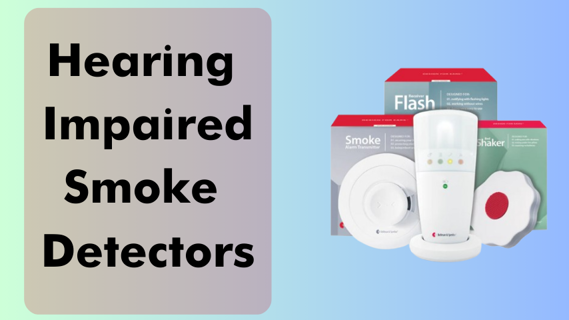
Hearing Impaired Smoke Detector: Ensuring Safety for All
Home safety is a priority for everyone, yet traditional smoke detectors often fail to accommodate the unique needs of individuals who are deaf or hard of hearing.
Thankfully, hearing-impaired smoke detectors offer innovative solutions to ensure everyone in the home is alerted in the event of a fire or smoke hazard.
With the rise of smart technology, these devices have become more efficient, accessible, and user-friendly, helping individuals feel secure and confident in their homes.
Why Standard Smoke Detectors May Not Be Enough
Traditional smoke detectors rely on loud audio alarms to alert occupants of danger. However, this system falls short of individuals with hearing impairments, which needs to be improved, potentially leaving them unaware during critical moments.
Key challenges with standard smoke detectors include:
Audio-Only Alerts: Ineffective for those with limited or no hearing ability.
Night-Time Risks: Even individuals with partial hearing may not notice the alarm when sleeping.
Lack of Alternative Signals: No visual or tactile alerts for immediate awareness.
Hearing impaired smoke detectors bridge this gap by incorporating advanced alerting systems that cater to these needs.
Features of Hearing-Impaired Smoke Detectors
Modern hearing impaired smoke detectors are designed with several cutting-edge features to ensure maximum safety:
Visual Alerts
Equipped with bright strobe lights that flash during an alarm.
The intensity of the light ensures visibility even in bright rooms.
Vibrating Alarms
Devices can include bed-shaker attachments that vibrate strongly to wake sleeping individuals.
These vibrations are designed to be distinct and impossible to miss.
Connectivity with Smart Home Systems
Many models integrate seamlessly with smart home systems.
Users can receive alerts on their smartphones or smartwatches.
Dual Functionality
Some detectors also alert for carbon monoxide (CO) poisoning, offering comprehensive safety coverage.
Battery Backup and Reliability
Long-lasting batteries or wired systems ensure constant readiness, even during power outages.
Benefits of a Hearing Impaired Smoke Detector
Investing in a specialized smoke detector provides peace of mind and heightened security for individuals and families.
Enhanced Safety: Alerts tailored to specific sensory needs reduce the risk of missed warnings.
Around-the-Clock Protection: Features like vibrating alarms ensure safety even during sleep.
Inclusivity: These detectors cater to the unique needs of individuals who are deaf or hard of hearing, promoting a more inclusive environment.
Compliance with Building Codes: In many areas, homes with deaf residents must have accessible smoke detection systems.
Top Hearing Impaired Smoke Detector Models to Consider
When choosing a hearing impaired smoke detector, it’s essential to consider your specific needs and preferences. Here are some leading options available:
SafeAlert Pro Hearing Impaired Smoke Detector
Features: Bright LED strobe lights and a vibrating bed-shaker.
Connectivity: Compatible with smart home systems for instant notifications.
Ideal For: Comprehensive protection in bedrooms and living spaces.
Lifesaver Hearing Impaired Smoke Alarm
Features: Dual smoke and carbon monoxide detection, with loud audio, visual, and vibrating alerts.
Battery Life: Long-lasting, with easy replacement options.
Ideal For: Families needing an all-in-one safety solution.
SmartGuard Vibrating Alarm System
Features: Smartphone integration, customizable alarm settings, and compact design.
Unique Selling Point: Fully wireless with easy installation.
Ideal For: Tech-savvy users looking for cutting-edge solutions.
Each option provides tailored safety for deaf people, ensuring every household can find a solution that fits their needs.
How to Choose the Right Hearing Impaired Smoke Detector
Selecting the right smoke detector requires careful consideration of your environment and preferences. Here are some factors to guide your decision:
Type of Alerts Needed
Visual Alerts: Ideal for common areas like living rooms.
Vibrating Alarms: Essential for bedrooms and sleeping spaces.
Connectivity Options
Opt for detectors that integrate with existing systems if you have a smart home setup.
Look for options that send real-time alerts to your mobile devices.
Coverage Area
Determine how many detectors you need based on the size of your home.
Install detectors in every bedroom, hallway, and central area for maximum safety.
Power Source
Battery-powered detectors are considered for flexibility, and hardwired detectors are considered for consistent power.
Ensure there’s a reliable backup system for outages.
Installation Tips for Hearing Impaired Smoke Detectors
Proper installation is crucial for the effectiveness of your smoke detector. Follow these guidelines for optimal results:
Placement Matters: Install smoke detectors on ceilings or high on walls as smoke rises.
Bedrooms First: Ensure every bedroom, especially for deaf individuals, has a detector with vibrating capabilities.
Test Regularly: Check the functionality of alarms, lights, and vibrations monthly.
Interconnect Devices: For larger homes, use interconnected alarms to ensure simultaneous alerts throughout the house.
Professional installation services can also provide peace of mind if you’re uncertain about setup.
Conclusion
Hearing impaired smoke detectors are not just devices; they’re life-saving tools that ensure safety and independence for individuals who are deaf or hard of hearing. With advanced features like strobe lights, vibrating alarms, and smart connectivity, these detectors are tailored to provide comprehensive protection.
Explore today's cutting-edge range of hearing-impaired smoke detectors to create a safer, more inclusive home environment. After all, everyone deserves the peace of mind that comes with knowing they’re protected.
Bellman & Symfonさんをフォローして最新の投稿をチェックしよう!
0 件のコメント
この投稿にコメントしよう!
この投稿にはまだコメントがありません。
ぜひあなたの声を聞かせてください。
